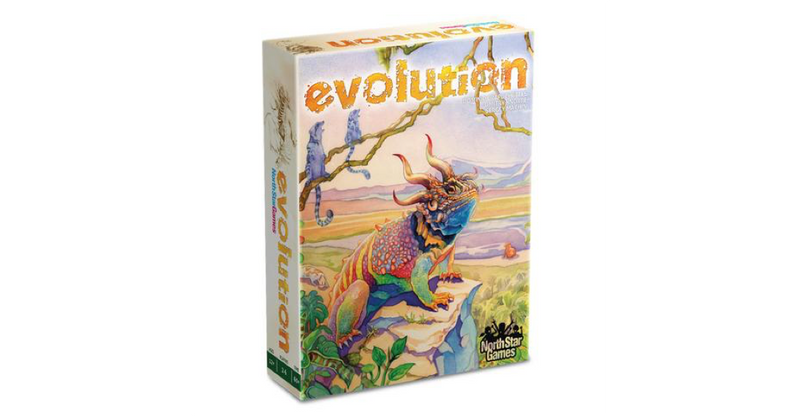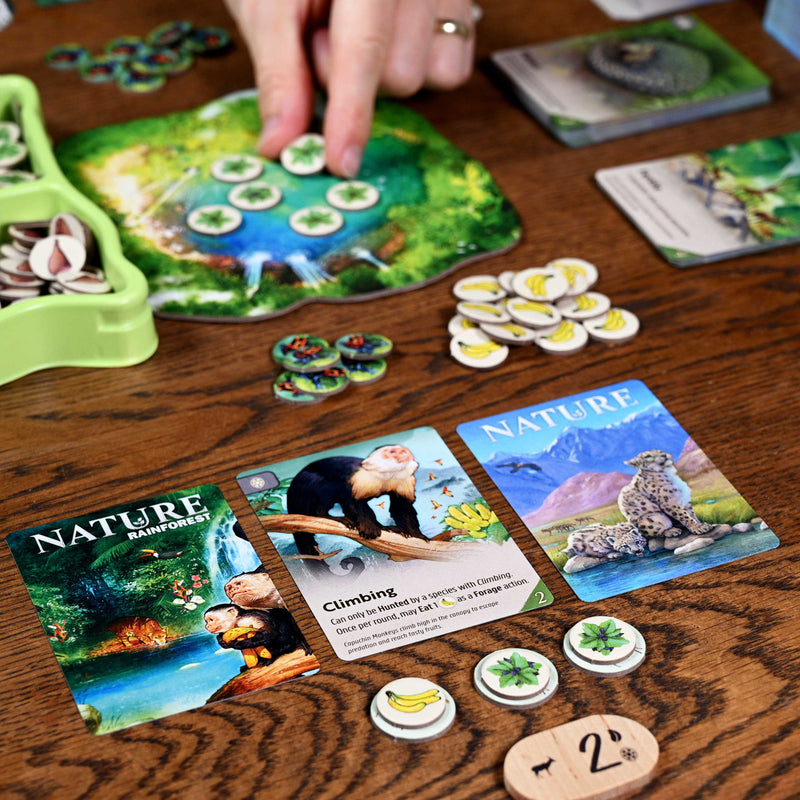
Here at North Star Games, we prize depth in games. The process of discovery, of peeling back layers, of finding a game is better and richer than it first seemed, is electrifying.
So when we designed our first strategy game, Evolution, a few years ago, a key goal was to make it deep.
It appears we succeeded. Evolution became a hit, tournaments popped up all over, and strategies bloomed like desert flowers after a rain. Multiple skill levels emerged and we've seen firsthand how different the game is at the higher levels.

The finalists from the 2017 Evolution World Championship, a 64 player tourney held at Pax Unplugged. All four of these players are unbelievably good.
So all is well? Mostly, but there's a hitch. As we've watched the public reception to Evolution and its descendants (Flight, Climate, and The Beginning), we sometimes wonder if we can keep justifying the (enormous) time we spend ensuring depth. Why?
While Evolution became a hit, its depth didn't play much of a role. Turns out depth doesn't necessarily sell games, and can even hurt sales.
Three problems with depth:
- By definition, you can't see it at first. It's only apparent with experience. Invisible features don't sell games.
- "But!" you say: "Depth provides replayability and that sells games". Except these days, that's less true. Because so many games are published now, folks play individual games less, which makes depth less important. We treat games like perishables. I travel around to game nights and over the years they've become less like game nights and more like rules-learning nights. The game industry is responding: many games are now designed only to be played a small, fixed number of times.
- Some find the prospect of depth intimidating. They think "This game is hard and will make me look dumb when a better player beats me, and that's no fun." So if a game gets a reputation for depth, it can even hurt sales. This may be why game designers are increasingly focused on creating narrative rather than strategy in their games.
The problem here is that making a living by selling games is hard, which means we have to be extremely careful about how we use our time. If making deep games isn't helping, or it's even hurting our sales, it's tough to justify.
Despite all this, we love depth, and we would LOVE to keep designing deep games. But we can only do it if our customers want it.
So, we're stepping onto our soapbox for the rest of this post and doing our little part to evangelize for depth. Specifically, we're writing about three ways to think about depth to illustrate its pleasures:
#1 - All deep games are legacy games
As you may know, the most popular new board game genre is the Legacy genre, pioneered by now-pretty-legendary designer Rob Daviau. In a Legacy game, the rules change permanently each time you play, and the way they change depends on the players' in-game actions.

(A weird picture of Rob Daviau, who's not usually this emo)
It's a cool idea, but you know what? A good, deep strategy game is like that too, but in an arguably even cooler way: it's not the rules that change, it's YOUR MIND, your very perceptions. When a grandmaster looks at a chess board, she sees a rich web of association and possibility where the rest of us just see squares and pieces. The grandmaster's mind has rewired itself around chess through focused exposure. You need a deep game for that, to repeatedly discover new things to weave into that web of associations.
That in itself is intoxicating, but better still: you can take this kind of "legacy" with you into real life. In my own life for example, playing deep games over and over have taught me to look for, and stay focused on, opportunities that yield compounding returns, and to look for those returns by disregarding prevailing opinion and trying things others don't. Through play, I've learned this lesson not just intellectually, but intuitively: I feel it in my bones. It's helped me accumulate real wealth! I'm filled with awe and gratitude for the role such games have played in my life.

(basically me now, thanks to deep games)
As an aside, we've seen Evolution has similar effects on those who strongly engage with it. It especially helps you grok how ecosystems work. See this excellent article from the wonderful Tabletop Gaming Magazine for more about how Evolution does that.
#2 - Commitment has value that casual flings don't (and vice-versa)
Depth has an emotional side too. Our relationships to games are in some ways like romantic relationships: there are flings, and there are long term relationships, and they have different roles:
A good fling is fun and spontaneous and exciting and new. The heart races with possibility.
A good long term relationship is a source of comfort, mutual exploration, growth, friendship, and a shelter from life's storms.
And so it is with games. The culture of board games places emphasis on flings now, and that's great! But we shouldn't forget the sustaining pleasures of commitment to something deep.

(perfunctory distracted boyfriend meme in a pathetic reach for hipness)
In this spirit, I like to have one game in my life that I play deliberately and often, for years at a stretch, until I get really good at it and becomes an old friend. It's awesome. I still play lots of other games promiscuously, but I privilege one over the others. It's like being a mormon.
#3 - A strategy game is a gift exchange
This bit is especially for folks intimidated by depth, or who don't like competition.
This is important: games aren't inherently competitions. Our culture imposes ideas of competition on everything so automatically it's hard to think of games in any other terms, but we can.
I've made this point elsewhere but I think it's so important, it should be repeated again and again until we can collectively change the way we think:
When you play a strategy game, you're not competing. You're taking turns gifting interesting puzzles, and in so doing, you help help each other learn.
If you can train yourself to think this way, not to pay the idea lip service but to really feel it, your hangups about winning and losing will vanish. It's also a way to practice being non-competitive in life generally, which can be a relief to those of us with competitive instincts.
What's the connection to deep games? They harbor more, and more interesting, gifts, because they contain so many puzzles to discover. Deep games are the best gift machines.
(Quick aside: since it can be hard for some to get into this frame of mind, here's a tip: try having the players talk through all their turns. Have everyone help the player whose turn it is make the best, most interesting move. This will create a collaborative, exploratory spirit. It nearly always works.)
Welp, that's it. I hope you found something useful here, or failing that, were mildly entertained. If you think I've said something dumb (it wouldn't be the first time), I'd love constructive criticism in the comments.
-Nick Bentley (note: I don't speak for everyone at North Star - some might disagree. If so, I'll ask them to post a rebuttal here)
You can buy Evolution here
(...and all the other Evolution games here)
(...and you can receive email alerts for future blog posts here. A new post goes up every two weeks)






So games like Shadowrun, Demons Crest, Harvest Moon, Actraiser, Ogre Battle, Breath of Fire, Evo, Mystical Ninja, the Super Star Wars games, XMen Mutant Apocalypse, several great Disney platformers, Lost Vikings, Prince of Persia or Battletoads Battlemaniacs don’t make the list, but TWO Mortal Kombat do, despite being highly overrated gimmicky and terrible fighters and being gimped on the SNES compared to their arcade counterparts?! Also, what’s with the lack of SHMUPs?Paul Brown
You are so right on about gaming strategy spilling over to RL in helpful ways. A couple years ago I had a really big problem. The gist, I had gotten a new roommate off of Craigslist and he ended up going behind my back to steal my rental from under me and get me evicted. Bad move. My partner at the time and I were both heavy duty gamers, and figuring out how to solve this difficult problem, involving many moving parts, including a huge one, I did not have money to move, and am disabled, I can’t just move a whole house and find a new place in 30 days. Coupled with a very disturbed paranoid roommate. UGH!
But I had watched how many seasons of Survivor? And managed resources in how many games? Both of those experiences DIRECTLY influenced how I gamed this situation, and game it I did. I knew from Survivor that information was power. So I set about very deliberately gathering information in a very Survivor fashion. I hid my real emotions and acted other ones. I made one promise to myself, to walk out of this with my head held high, and that I took the high road. So I deceived as ethically as possible, did not take revenge, just strategized and made moves that ended up getting my move paid for, and the time I needed.
It helped that the landlady made an illegal eviction under Fair Housing, putting it in writing the reason she was asking me to leave had to do with health related matters, and she signed an illegal lease w the new guy – turns out you can’t lease a property to someone else while there is an existing lease. So they made really stupid moves, and I was able to leverage the two of them against each other using skills from Survivor and Eurogaming.
It was an epic FTW, and I am so proud of both how I handled the situation logistically and morally. Without these skills, the old me, would have been a vengeful puddle of kick me victimhood. This had a powerful impact on me, and I have applied these skills in other less volatile situations to good effect. I have a micro business. It is no different than say playing any other resource management game, and I look at it that way.
It has made me smarter in business, and were I not disabled, I could be much bigger than I am. Games also have bolstered my resilience in general. I have a gaming motto, NEVER GIVE UP! I didn’t realise how much that is also my life model. Having chronic pain for 20 years, I have to.
Side off topic note, I also use games to help with pain, the processing it takes to be in the game actually blocks pain impulses….see research in a fabulous book called Super Better, which is about using gaming strategy to better your life. A must read!
PS I love Evolution! I have Climate, but I have yet to get it to the table.
Indeed! The meta-game (because that’s pretty much what you’re writing about) is a very important thing for Evolution and it’s what gives it such replay value despite the relatively simple rules and limited cards/combos. But it is also a bit intimidating and thats in part why I backed, and am looking forward to, the Evolution video game and its tournaments. Bring it on!
Evolution came up at a different gaming event I was attending last weekend. The person said they liked it and was amazed that the science and biology of it was “actually correct!”. While sometimes not felt, the hard work put into a game like that DOES get noticed :)
Great article!